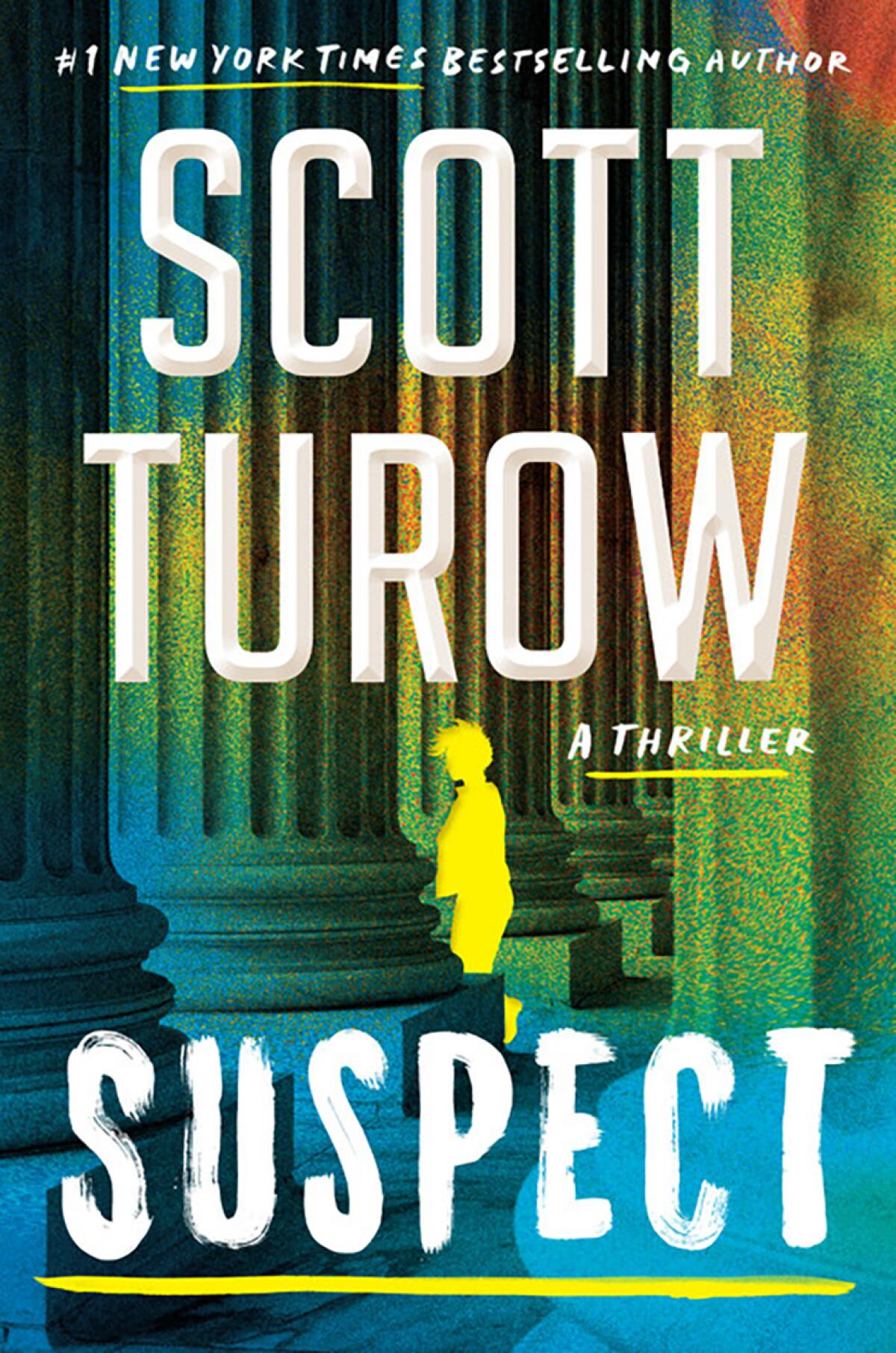Review: In his latest thriller, Scott Turow tries to learn some new tricks

On the Shelf
Suspect
By Scott Turow
Grand Central: 448 pages, $29
If you buy books linked on our site, The Times may earn a commission from Bookshop.org, whose fees support independent bookstores.
Nothing is immune from the ravages of time, not even the fictional universes created by crime writers. But what does an author do when a series protagonist gets to a certain age? Some defy the rules: Over 25 novels in Sue Grafton’s Alphabet series, written over as many years, Kinsey Millhone ages by less than a decade. Michael Connelly’s Harry Bosch, on the other hand, is now a septuagenarian, fighting crime as well as a life-threatening illness.
Among the many characters who inhabit Scott Turow’s fictional Kindle County, Ill., he considers its First Citizen to be Alejandro “Sandy” Stern. The lawyer was already in his early 50s in 1987, when he defended chief deputy prosecutor Rusty Sabich in Turow’s blockbuster debut, “Presumed Innocent.” Ever since, the author has periodically returned to Stern, most recently in 2021’s “The Last Trial,” covering the eminent attorney’s final case before closing the law firm he founded with a daughter. At 85, a cancer survivor with several comorbidities, it was time for Sandy to cede center stage, leaving readers to wonder how the Kindle County universe and its characters would evolve into the new millennium.
They probably wouldn’t have bet on Clarice “Pinky” Granum, Stern’s pink-haired, Day-Glo-tattoed, nose-nail-wearing granddaughter. In “The Last Trial” Pinky was a quirky paralegal and police academy washout, having failed the drug test shortly before graduation. Two years later, now 33, she has transformed herself — sort of — into a private investigator, courtesy of a training course provided by Sandy’s firm, working for attorney Rik Dudek. With her unconventional background and connection to the venerable Stern, Pinky is both the underdog and the most likely narrator for a 21st century reboot of Turow’s legal-thriller universe, his 12th novel, “Suspect.”
This article was originally on a blog post platform and may be missing photos, graphics or links.
While Turow wasn’t the first attorney to write a legal thriller, or the most prolific — Erle Stanley Gardner’s Perry Mason mysteries number some 80 — he has created a body of work that is unparalleled in the breadth of its examination of the law and human relationships. In crafting the case at the center of “Suspect” — a sextortion charge against a female chief of police in the grim city of Highland Isle, some thousand yards across a river from Kindle County — and in making spiky, bisexual Pinky the narrator, he has brought his characters and settings into the era of #MeToo and DEI initiatives; he’s also set himself a particularly steep challenge.

Twelve years ago, Kindle County detective and Desert Storm veteran Lucia Gomez-Barrera was promoted to Highland Isle’s top police post by a reform-minded female mayor. Now, she stands accused by three officers of demanding sex in exchange for promotions. Facing possible termination, she turns to Dudek, an old high school friend, for representation at the Police and Fire Commission’s disciplinary hearing. Dudek, who Pinky notes has “the shape of an autumn gourd,” is a distant relative of hers via Sandy’s second marriage. But unlike Pinky’s beloved grandfather, who represented “all the richest crooks in the Tri-Cities,” Dudek takes workman’s comp and personal injury cases to keep the lights on. Pinky reckons Chief Gomez’s high-profile case “might help him finally step up.”
While preparing for their first face-to-face meeting with their biggest client, Pinky is more concerned about her neighbor, The Weird One. TWO, as she calls the hunky middle-aged Asian American man, moved the month before into the apartment next door to hers. TWO has no friends and no visible employment, and he keeps odd hours. Dudek teases his investigator for her paranoia, at first: “Pinky, your imagination must be one of the most interesting places on earth. It’s like living in 4-D. All this stuff that never could happen, and you’re running it as a feature attraction.”
Tanarive Due, Naomi Hirahara and other local authors break down the South L.A. people and places that inspired the stories in a rich new anthology.
With the help of Pinky’s PIBOT, a “Private Investigator’s Bag of Tricks” picked up from her studies and YouTube videos, the case grows more complex as “Suspect” toggles between the disciplinary hearing against Chief Gomez, which seems particularly weak at the outset, and Pinky’s dogged, quasi-stalking of her neighbor, which opens possibilities of foreign espionage against a large defense contractor and a lot more. Both cases are enlivened by Pinky’s razor-sharp, millennial observations and complicated love life. That includes Tonya Eo, a former girlfriend who’s now “all glo’d up” and a rising star in the HIPD, and — well, it would be criminal to reveal Pinky’s other romantic interest, which only thickens the plot, as does a murder midway through, which provides a much-needed albeit hard-to swallow connection between the two seemingly incongruous plotlines.
Needless to say, Pinky ain’t no Sandy Stern — nor should she be. Turow finds roles in “Suspect” for some of Stern’s former cohort as a way to bridge the divide, and Pinky still employs her grandfather’s wisdom, along with his old Cadillac CTS, and even visits “Pops” at an assisted living facility, where he’s found a new love interest. But she’s in uncharted territory and so is Turow. The author takes a risk with a first-person narrative centered on a complex character more reminiscent of Lisbeth Salander than Sandy Stern, set in a city that’s definitely not in Kindle County.
While Turow’s new protagonist is a breath of fresh air, there are some implausible twists involving TWO and the person pulling his strings, plot-dragging doldrums filled with TMI about Pinky’s romantic entanglements, clunky investigative exposition and minor gaffes around a central Black character. What’s truly suspect, though, is the question of why Turow wasn’t more thoughtful in shaping important plot points, characters and motivations. Nonetheless, by the novel’s somewhat abrupt ending, it’s clear that time marches on, as will Pinky Granum. Whether she will mature into a character worthy of the Kindle County legacy, only more time will tell.
The latest from Ling Ma, Yiyun Li, Russell Banks and Namwali Serpell as well as exciting newcomers round out our critics’ most anticipated fall books.
Woods is a book critic, editor and author of four Detective Charlotte Justice mysteries.
More to Read
Sign up for our Book Club newsletter
Get the latest news, events and more from the Los Angeles Times Book Club, and help us get L.A. reading and talking.
You may occasionally receive promotional content from the Los Angeles Times.











